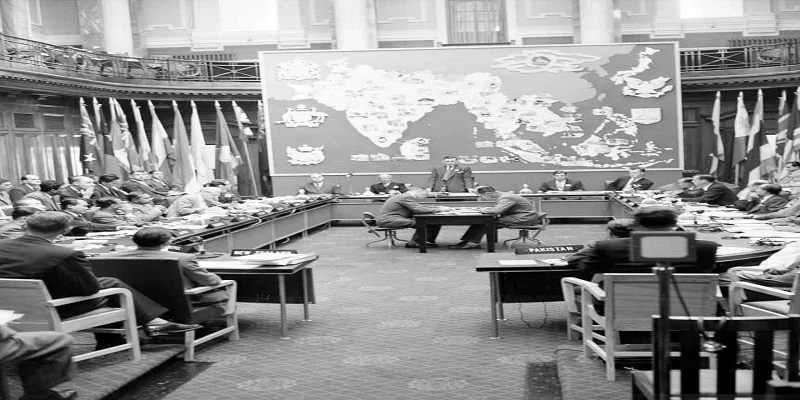Colombo Conference 1954: Afro-Asian Unity for Peace & Stability
The Colombo conference took place on 28 April 1954 in Ceylon and was completed on 2 2 May 1954. This gathering included Ceylon, Indonesia, Burma, India and Pakistan. The name of Colombo powers also referred to the conference participants. All of them met to discuss issues and the issues that are related to them all. They discussed their views on the common interests of all participants at this meeting. The conference did not meet concerning a specific issue.
World War II ended in 1945; its conclusion did not bring peace and stability to the world. Following the end of World War II, colonialism started its return journey. However, several Afro-Asian states gained independence, while several were still striving for independence, e.g. Vietnam in Indochina. Colonialism certain Afro-Asian nations were confronted with issues of colonialism, like the Kashmir issue, which was the source of continuous tension between India and Pakistan after their independence. Palestine issue, which caused conflict between Arabian countries, etc. The Afro-Asian nations at the time were also concerned about nuclear arsenal. Even though the United Nations was present to address the world's issues, it needed to manage them properly. This is why these Afro-Asian nations organize conferences to resolve the issues of their shared interest.
India and Pakistan were among the prominent participants in the Colombo Conference (1954) together alongside Indonesia, Burma and Ceylon. Prime ministers from all five countries took part in the conference. In the first session, the five nations stressed various aspects. Pakistan stressed the importance of the Kashmir issue. Ceylon was focusing on the dangers of communism and requested Mutual Corporation regarding this point. Burma was focusing on economics. India emphasized bringing peace to its relations with China. Indonesia is requesting an Afro-Asian conference.
At this conference, a ceasefire was suggested in the Indochina conflict without delay, and it was recommended to engage in direct negotiations on this issue. Participants in this conference also protest against nuclear weapons and other instruments of mass destruction.
The participants at this conference condemned colonialism and stressed the need to establish a democratic system and democracy in their respective countries. They also condemned interference by countries that are communist or anti-communist in their issues. When the issue of Red Chinese representation in the United Nations was asked, all those present voted for it. To promote peace, ease tension and encourage peace and stability worldwide. They favoured Red China to solve the global problem, specifically concerning the Far East problems, with a realist strategy.
The conference provided an opportunity for the premier from India and Pakistan to get together with each to discuss significant problems like great rivalries in power, the Indochina conflict, colonialism, as well as other issues, even though they differed on the Kashmir issue. The leaders of the Colombo conference are under demand in the form of Arab, Asian states and India. They all demanded negotiations on peace and ending the conflict in Korea. Because of Indian pressure, this conference spent most of its time discussing the Indochina conflict. The Colombo conference also discusses the Palestine question. The participants were incredibly supportive of the people in Palestine, and all of them hoped to see a fair and peaceful resolution to Palestine.
There was no war between India and Pakistan, but this conference could not solve the Kashmir conflict. Ceylon was a crucial participant in the conference. The Prime Vice-Minister Kotelawala of Ceylon suggested a military alliance with Ceylon's Colombo powerhouses as an alternative to the regional security doctrine proposed by the United States.
The attention of the conference participants was drawn by the Indonesian premier, who asked about where we are in the present. He then provided a brief answer. Ceylon played an essential part in the conference. Ceylon was a crucial participant in the Colombo conference. It was decided the possibility of holding an Afro-Asian conference for the first time. Indonesia presented the idea of creating an Afro-Asian conference at the Colombo conference. The conference produced a remarkable result through the Bandung conference, which was launched in December 1954. They also laid the foundation for the Afro-Asian conference during the same conference.
The Colombo conference significantly contributed to bringing Afro-Asian nations to a certain level. It was crucial in the Indochina conflict, but the Cold War issue established its value specifically as an effort to unite the region. The conference sought to address critical issues at the time and managed to address these issues in a way. It opened the way for peace conferences to come in the future that profoundly impact the world political system. But Pakistan was unable to resolve the Kashmir problem. It was attempting to bring peace and stability to the world.

